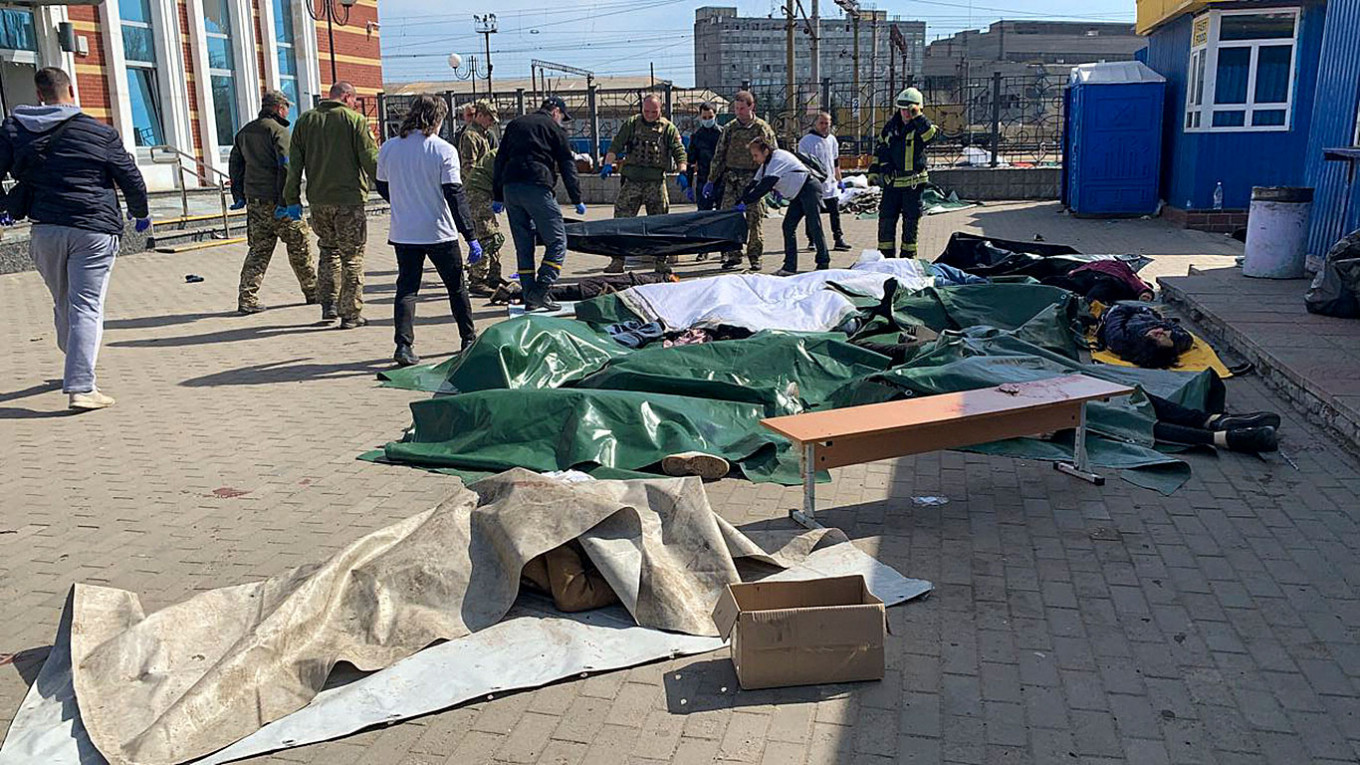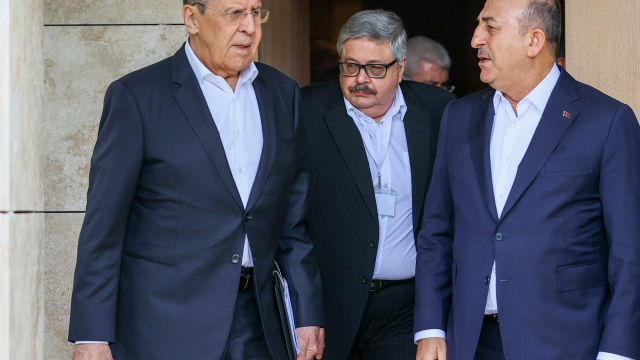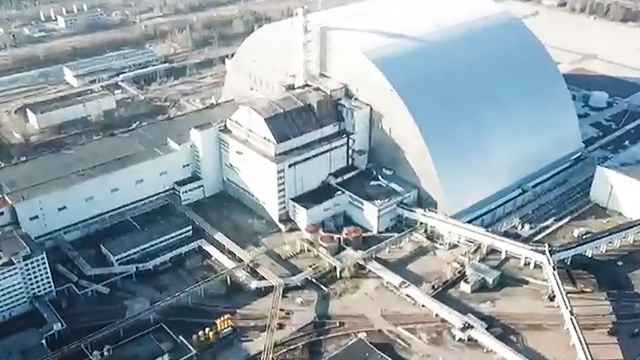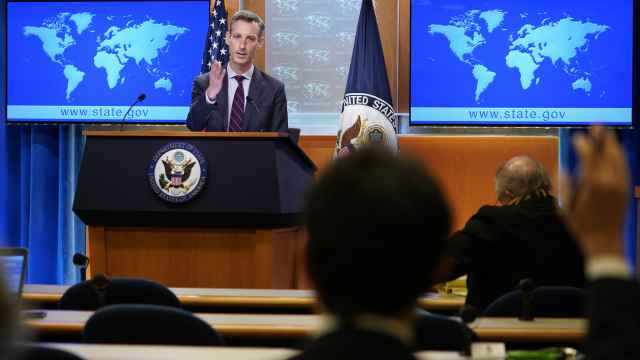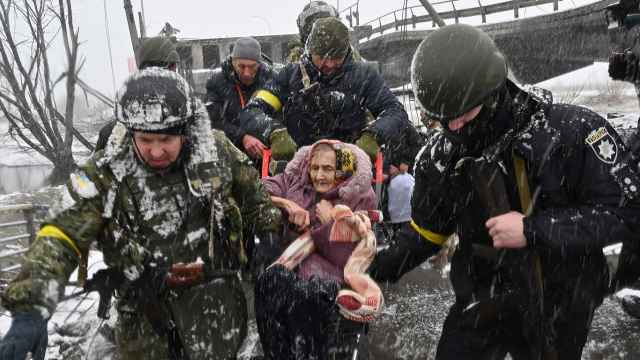A rocket attack on a train station in the eastern Ukrainian city of Kramatorsk killed dozens on Friday, as civilians raced to flee the Donbas region bracing for a feared Russian offensive.
World leaders condemned the attack with U.S. President Joe Biden accusing Russia of being behind an "horrific atrocity" while the French government called it a "crime against humanity" and British Prime Minister Boris Johnson described it as "unconscionable."
Fifty people were killed, including five children, the regional governor of Donetsk, Pavlo Kyrylenko, said as the toll rose on one of the deadliest strikes of the six-week-old war.
President Volodymyr Zelensky reported 300 were injured, saying the strike showed "evil with no limits."
Odessa, fearing an attack on the Black Sea port city, imposed a weekend curfew "given events in Kramatorsk" and the "threat of a missile strike."
AFP journalists at the scene of Friday's strike saw the bodies of at least 30 people under plastic sheets next to the station.
There were pools of blood on the ground and packed bags were strewn outside the building where the remains of a large rocket was lying with the words "for our children" in Russian.
"I'm looking for my husband. He was here. I can't reach him," a woman told AFP, sobbing and holding her phone to her ear.
Another woman in a state of shock said: "I saw people covered in blood entering the station and bodies everywhere on the ground."
Body parts, broken glass and abandoned baggage lay scattered around the station and across the platform.
Russia's Defense Ministry said suggestions it had carried out the attack were "absolutely untrue."
The bombing came as European Commission President Ursula von der Leyen and EU foreign policy chief Josep Borrell were in Kyiv to show solidarity with Ukraine.
Russia faces "decay" because of ever more stringent sanctions and Ukraine had a "European future," she said at a news conference with Zelensky.
More than a month into President Vladimir Putin's invasion of Ukraine, Moscow has shifted its focus to eastern and southern Ukraine after stiff resistance torpedoed plans to swiftly capture the capital Kyiv.
Instead, Russian troops appear set on creating a long-sought land link between occupied Crimea and the Moscow-backed separatist statelets of Donetsk and Lugansk in Donbas.
Heavy shelling has already begun to lay waste to towns in the region, and officials have begged civilians to flee, while the intensity of fighting is impeding evacuations.
But officials continued to press civilians to leave.
"There is no secret — the battle for Donbas will be decisive. What we have already experienced — all this horror — it can multiply," warned Lugansk regional governor Sergiy Gaiday.
"Leave! The next few days are the last chances. Buses will be waiting for you in the morning," he added.
'More horrific'
Meanwhile, near the capital Kyiv, residents and Ukrainian officials returning after a Russian withdrawal from the area were trying to piece together the scale of the devastation.
Violence in the town of Bucha, where authorities say hundreds were killed — including some found with their hands bound — has become a byword for allegations of brutality inflicted under Russian occupation.
But Zelensky warned worse was being uncovered.
"They have started sorting through the ruins in Borodianka," northwest of Kyiv, he said in his nightly address.
"It's much more horrific there. There are even more victims of Russian occupiers."
Violence in the area has caused massive destruction, leveling and damaging many buildings, and bodies are only now being retrieved.
Ukraine's Prosecutor General Iryna Venediktova said on Thursday that 26 bodies had been recovered from two destroyed apartment buildings so far.
"Only the civilian population was targeted. There is no military site here," she said, describing evidence of war crimes "at every turn."
Fresh allegations emerged from other areas too, with villagers in Obukhovychi, northwest of Kyiv, telling AFP they were used as human shields.
'Help us now'
Moscow has denied targeting civilians but growing evidence of atrocities has galvanized Ukraine's allies to pile on more pressure.
On Thursday, the EU approved an embargo on Russian coal and the closure of its ports to Russian vessels as part of a "very substantial" new round of sanctions that also includes an export ban and new measures against Russian banks.
In addition, it backed a proposal to boost its funding of arms supplies to Ukraine by 500 million euros ($544 million), taking it to a total of 1.5 billion euros.
So far, the bloc has frozen 30 billion euros in assets from blacklisted Russian and Belarusian individuals and companies under sanctions, it said Friday.
In a show of support, the EU's von der Leyen and Borrell were in Kyiv Friday for talks with Zelensky and to visit the scene of civilian deaths in Bucha.
En route to Kyiv, Borrell told journalists the EU would supply 7.5 million euros to train Ukrainian prosecutors to investigate war crimes, which Russia is accused of committing in the country.
The Group of Seven industrialized nations also agreed to more sanctions, including a ban on new investments in key sectors and fresh export restrictions, as well as the phasing out of Russian coal.
At the United Nations, 93 of the General Assembly's 193 members voted on Thursday to suspend Russia from the body's human rights council over its actions in Ukraine.
Russia blasted the move as "illegal and politically motivated," while U.S. President Joe Biden said it confirmed Moscow as an "international pariah."
"Russia's lies are no match for the undeniable evidence of what is happening in Ukraine," Biden said, calling Russia's actions in the country "an outrage to our common humanity."
Ukraine has welcomed new measures on Moscow, as well as the UN suspension, but it continues to push for more support.
Zelensky called for a "cocktail" of sanctions in an address to the Finnish parliament, scolding "those who are making us wait, wait for the things that we need badly, wait for the means of protecting our lives."
The president's appeal echoed a call from his foreign minister, Dmytro Kuleba, who earlier asked NATO for heavy weaponry, including air defense systems, artillery, armored vehicles and jets.
"Either you help us now — and I'm speaking about days, not weeks — or your help will come too late and many people will die, many civilians will lose their homes, many villages will be destroyed," Kuleba said after meeting NATO foreign ministers in Brussels.
Following his latest appeal, Britain on Friday said it was sending Ukraine more "high-grade military equipment" including Starstreak anti-aircraft missiles and 800 anti-tank missiles, while Slovakia said it had given Ukraine an S-300 air defense system.
A Message from The Moscow Times:
Dear readers,
We are facing unprecedented challenges. Russia's Prosecutor General's Office has designated The Moscow Times as an "undesirable" organization, criminalizing our work and putting our staff at risk of prosecution. This follows our earlier unjust labeling as a "foreign agent."
These actions are direct attempts to silence independent journalism in Russia. The authorities claim our work "discredits the decisions of the Russian leadership." We see things differently: we strive to provide accurate, unbiased reporting on Russia.
We, the journalists of The Moscow Times, refuse to be silenced. But to continue our work, we need your help.
Your support, no matter how small, makes a world of difference. If you can, please support us monthly starting from just $2. It's quick to set up, and every contribution makes a significant impact.
By supporting The Moscow Times, you're defending open, independent journalism in the face of repression. Thank you for standing with us.
Remind me later.


